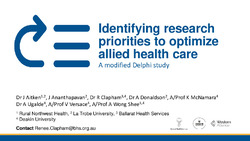Please use this identifier to cite or link to this item:
http://hdl.handle.net/11054/1497Full metadata record
| DC Field | Value | Language |
|---|---|---|
| dc.contributor | Wong Shee, Anna | en_US |
| dc.contributor | Clapham, Renee | en_US |
| dc.contributor | Aitken, John | en_US |
| dc.contributor | Donaldson, Alex | en_US |
| dc.contributor | Ananthapavan, Jaithri | en_US |
| dc.contributor | McNamara, Kevin | en_US |
| dc.contributor | Uglade, A. | en_US |
| dc.contributor | Versace, Vincent | en_US |
| dc.date.accessioned | 2020-01-09T21:52:21Z | - |
| dc.date.available | 2020-01-09T21:52:21Z | - |
| dc.date.issued | 2019 | - |
| dc.identifier.govdoc | 01463 | en_US |
| dc.identifier.uri | http://hdl.handle.net/11054/1497 | - |
| dc.description.abstract | Aim: In health service research, it is vital that w Aim: e address questions that are important to patients and that the research meets a health service need or gap in the evidence. This study brings together people from the community, clinicians and academic researchers to identify priorities for allied health research in the Grampians region. Methods: Phase 1: Survey and focus groups will be used to : elicit information about consumers’ experiences of allied health care; their perceptions of service gaps, ways to optimize care, patient-centred care, and on how to prioritise competing health care issues; and areas for service improvement and further research. Phase2: Using a modified Delphi method, a panel including community members, clinicians, health service managers, and researchers will firstly review information from phase 1, then generate additional ideas, and finally identify and agree on research priorities. Results: Results: Fifty respondents from rural communities have participated in the survey and three community forums have been conducted (n=12). Preliminary analysis of the focus group data identifies several health care issues in rural areas including: (1) access to quality care – availability and experience of specialists and other health providers, limited support services; (2) cost – cumulative costs for people with chronic conditions, urgent care fees in rural areas; (3) isolation – geographical (distance to services) and social (older populations); and (4) cultural factors – reluctance to seek help, fear of stigma, difficulty maintaining privacy and confidentiality in small communities. Conclusion: Conclusion: Respondents have been passionate about a range of health issues in their communities. Future forums will focus on vulnerable groups, including indigenous people and people with disabilities. Health professionals are currently being recruited to have their say about health issues in their communities. | en_US |
| dc.description.provenance | Submitted by Gemma Siemensma (gemmas@bhs.org.au) on 2020-01-09T05:45:52Z No. of bitstreams: 0 | en |
| dc.description.provenance | Approved for entry into archive by Gemma Siemensma (gemmas@bhs.org.au) on 2020-01-09T21:52:21Z (GMT) No. of bitstreams: 1 Delphi_WesternAlliance_Clapham.pdf: 525332 bytes, checksum: 7e5eb8922dbf23172ba54a0d8281cb14 (MD5) | en |
| dc.description.provenance | Made available in DSpace on 2020-01-09T21:52:21Z (GMT). No. of bitstreams: 1 Delphi_WesternAlliance_Clapham.pdf: 525332 bytes, checksum: 7e5eb8922dbf23172ba54a0d8281cb14 (MD5) Previous issue date: 2019 | en |
| dc.title | Identifying research priorities to optimize allied health care – informed by consumers: a modified Delphi study. | en_US |
| dc.type | Conference | en_US |
| dc.type.specified | Presentation | en_US |
| dc.bibliographicCitation.conferencedate | 2 - 4 November | en_US |
| dc.bibliographicCitation.conferencename | Western Alliance Sixth Annual Symposium | en_US |
| dc.bibliographicCitation.conferenceplace | Ballarat, Australia | en_US |
| dc.subject.healththesaurus | HEALTH | en_US |
| dc.subject.healththesaurus | RURAL | en_US |
| dc.subject.healththesaurus | PRIORITIES | en_US |
| dc.subject.healththesaurus | RESEARCH NEEDS | en_US |
| dc.subject.healththesaurus | CONSUMER INPUT | en_US |
| Appears in Collections: | Research Output | |
Files in This Item:
| File | Description | Size | Format | |
|---|---|---|---|---|
| Delphi_WesternAlliance_Clapham.pdf | 513.02 kB | Adobe PDF |  View/Open |
Items in DSpace are protected by copyright, with all rights reserved, unless otherwise indicated.
